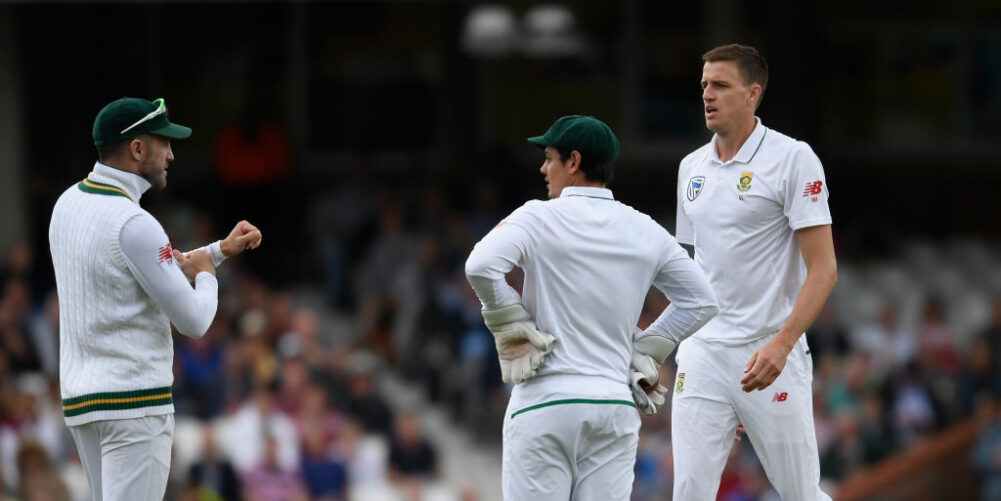(Photo: Getty Images)
By Neil Manthorp
The bleakness with which the results from South Africa’s three-month long tour of England have been received is to be expected. Some of it may have become a little too personal, but that’s far better than being ignored. Or should be. At least South Africans still care.
Questions about the depth of the country’s playing resources can also be a red-herring. The reality is that there are enough good players at the top of the pyramid to form winning squads in Test and ODI cricket. Nobody should be concerned too much about T20 Internationals for the moment. South Africa use the platform as a ‘beginners guide’ to international cricket and have never been very good at it anyway.
Eight of the first-choice Test XI are comfortably the best in their class and will almost certainly play the majority of the ten Test matches coming up this summer. Dean Elgar, Hashim Amla, Temba Bavuma, Faf du Plessis, Quinton de Kock, Keshav Maharaj, Kagiso Rabada and Morne Morkel have no pretenders to their positions.
Vernon Philander should be on that list, too, but patience ran out with his modest fitness record in dramatic fashion when he withdrew his availability on the morning of the fourth Test with a stiff back. Du Plessis informed the leader of his attack that he was becoming a ‘laughing stock’ in world cricket and a liability to the team. At his best, he is unsurpassed.
“Vern is probably the best in the world in seaming, swinging conditions which we had in all four Test matches, so not having him here was very frustrating and disappointing,” du Plessis said.
“It is a challenge for him because it’s happened too often that he doesn’t play a full series. I’ve spoken to him about that and he’s accepted the challenge. There have just been too many times when we as a team go (gulp), ‘Vern might be injured again’. So he’s taken it on board from a fitness point of view. We have important series coming up, India and Australia at home, it’s eight Test matches and he needs to be fit to get through all of them.”
Philander’s fitness aside, the most important task facing du Plessis, the new coach and anybody else with influence over the country’s greatest modern-era batsman, is persuading AB de Villiers to make himself available for those Test matches. ‘Persuasion’ of the wrong sort, of course, would be counter-productive. A reluctant de Villiers would be a shadow of his real self. Du Plessis knows him better than most and, sadly, he holds out little hope. His frustration is obvious, too.
“I would love AB to play – we all know how good he is and we’ve missed him, but we’ve spent too much time talking about when he is going to come back. The hope of him coming back is something we need to move past, we need to find someone else who can fulfil that role. If AB comes back it’s a huge bonus, but I don’t expect him to come back into the Test team.”
Acquiring the services of Ottis Gibson as the new coach, although far from straightforward, might be easier. He remains contracted to the ECB as England’s bowling coach and, if they do allow him to move to a position he clearly covets, there may be compensation to pay and CSA do not part with their cash easily. Perhaps the millions of dollars supposedly being paid by the Global T20 Franchises will change that.
Bangladesh are the first summer visitors and they will not be the push-overs they once were. The Proteas need to find an opening partner for Elgar and decide whether to pursue a four-man pace attack with the excellent Maharaj providing the spin, or revert to the three-seamer policy which served them so well while Dale Steyn was one of them. Steyn is 34 and will have been out of the game for 11 months once the first Test is played. He might have another year at the highest level, or even two, but starting a Test match with both him and Philander would seem an unwise gamble.
If former West Indian all-rounder and coach, Gibson, is confirmed as the replacement for Russell Domingo, he will begin his tenure with some extremely good raw material. And some excellent matured material, for that matter. He was a fine player in a career which included six seasons in South Africa in the 90s, during which time he developed a strong affection and affinity with the country. He will not be caught unawares by the unique demands of South African cricket. In fact, they are one of the reasons he was so keen to make himself available for the challenge.
The ODI series here in England was lost. The Champions Trophy ended in ignominy. The T20 series was lost and England won three Tests in a series against South Africa for the first time since 1960, and won a series on home soil against them for the first since 1998. It all felt extremely gloomy. But there are reasons to be confident that it might all brighten up again soon. At least short-term.
England’s obsession with the Ashes was, as always, a fascination for South Africans this summer. We live and evolve in a four-year cycle around the World Cup. All our focus is on banishing the overwhelming memories of disaster which have built, with increasing momentum, since 1992. Perfectly good, potentially excellent players are not given a chance because they may be ‘too old’ by the time of the next one.
England and Australia work on a two-year cycle of such hype and success it makes them unqualified to judge or comment on the future of the Test game. They bask in the glorious success of one of sport’s greatest and most enduring contests. How can they possibly care, or even know of the struggles we have keeping Test cricket alive in the outlying regions?
We are doing our best but maybe, one day, the ‘Ashes Cartel’ will reflect that it should have done more to keep the Test game alive. Unless it really can survive in isolation?
“One thing of interest to me is how obsessed everyone is with having answers before the series begins,” said Graeme Smith shortly before his commentary commitments ended.
“Some answers take time. Will Keaton Jennings fail, is Tom Westley the man, Dawid Malan… you can’t have all the answers before you get there. Maybe England need to be more flexible in their decision-making. Give guys a chance to succeed and fail. If they were a little less uptight I’d make them slight favourites to win.”















